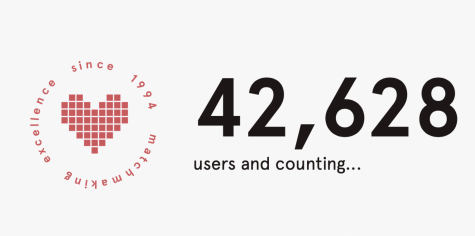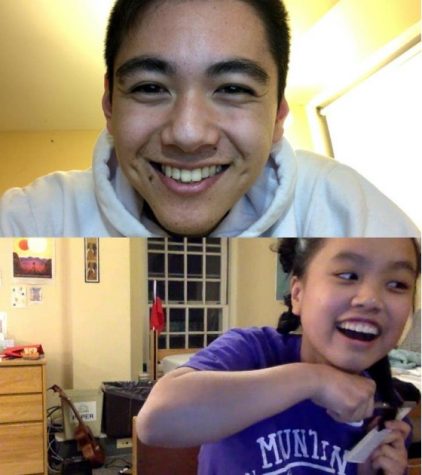Students look for friendship and romance on Datamatch
March 3, 2021

For most students on campus this semester, Valentine’s Day fell in the middle of their initial in-room quarantine, making many feel the lonely weight of confinement within their rooms. In search of friendship, and maybe love, some students connected with each other through a college-centered website called Datamatch.
Datamatch, a website which has chapters at colleges and universities around the country and was brought to the College in 2019, surveys students and matches them with potential partners based on their answers. Matches were revealed on Valentine’s Day, and students could choose to follow-up with their matches either virtually or socially distanced on campus.
Victoria Liu ’21, the campus lead for Datamatch at the College, said that every winter, she and a group of other students brainstorm questions and market the platform in preparation for producing matches come February.
“I think being in a pandemic has allowed everyone to share more — not everyone is bound by the same campus setting or context anymore,” Liu wrote in an email to the Record. “The hope is that people could meet others (and perhaps learn more) in Datamatch’s virtual settings.”
Participants shared similar sentiments about using Datamatch to meet their peers. “Since most clubs have just been on Zoom or haven’t been meeting, I figured trying Datamatch could help me expand my social circle and find other people with similar interests,” said Milo Chang ’24. “There’s so many people who I’ve never even seen on campus, so I thought that Datamatch would be a nice way to meet some new people.”
“I signed up for Datamatch because EphMatch didn’t really result in anything,” Allison Geis ’24 wrote in an email to the Record. “I was/am looking for friends on campus, [and] if we ended up dating that’d be cool.”
Angela Chen ’23 matched with her podmate Rito Tanaka ’23 not through the Datamatch algorithm but through its search feature, in what started as a joke between the two friends. Initially, Chen had selected the matching options for friendship as well as for love. “Not in the sense of ‘I’m going to find true love,’ she said, “but in the sense of ‘I would love to meet new people,’ especially at a time when everyone is locked in their rooms, including [Rito] and all of my podmates and friends.”
Among the 15 questions that comprised the Datamatch survey, many were geared toward specific aspects of Williams culture — favorite Spring Street locations, imaginary Winter Study courses, and stalking peers through Williams Students Online (WSO) profile photos, to name a few.
“I found the questions to be pretty funny,” said Geis. “It didn’t feel like they were actually trying to match us based on interests or personality, though — maybe more by sense of humor.”
Many students took issue with one question, however, which asked users for their “weapon of choice if you were to storm the Capitol.” While the answer choices themselves were fairly mild (“Jared, my pet iguana,” “gladiator shield,” etc.), some students said they felt that the question itself was insensitive, especially towards marginalized groups threatened by the rioters’ actions.
“Most of the questions were cute, but the one about storming the Capitol was not,” Sophia Throop ’23 wrote in an email to the Record. “It made light of a serious issue and because we had to answer it to complete the survey, everyone who used Datamatch had to consent to (or at least tolerate) joking about it, which was not cool.”
Liu explained that the question was meant to add a 2021-specific spin on the questionnaire, but mentioned that the Datamatch team will take feedback about the questionnaire seriously. “Regarding the capital riot question specifically, our team thought it would be an interesting angle to the overall mix of questions that go into the algorithm pool,” she said. “We strive to improve every year and feedback over the very little time we’ve been on campus will definitely incorporate into our coming involvements.”
Once students had completed their surveys and received their matches on Valentine’s Day, some said that surprisingly little happened with their would-be friends and dates.
“I didn’t mutually match or meet with anyone even though all my matches seemed cool,” Throop said. “I got scared and did homework instead.”
“Actually, that’s not entirely true — I matched with one of my friends whose bio said ‘ask me about sugma’ so I could message him and ask what ‘sugma’ was,” Throop added. “Then I got verbally decimated. Then I did homework.”
Chang matched platonically with someone who later turned out to be a TA for his math course. “We texted back and forth a few times about what courses we were taking and some of our interests,” he said. “We haven’t met ‘live’ in person or on Zoom yet, but since he is my TA, I have a feeling I’m going to need a lot of help in the coming weeks.”
“I followed [my matches] on Instagram,” Geis said. “I think one messaged me a joke? Yeah, other than that — absolutely nothing.”
Chen and Tanaka were able to better engage with one another, but even they struggled to come up with something to do together. After completing the “easy” crossword puzzle suggested by Datamatch itself, the two friends pulled out a 36-set questionnaire by the New York Times that would allegedly lead to love. Around question two or three, Chen decided upon an impromptu self-haircut over Zoom.
“I got his pairs of scissors and his comb and his setup on call… I had the computer to one side… I laid out this huge trash bag in my room,” Chen said.

“And meanwhile, we still kept going with the questions to fall in love,” Chen continued. “So, at the same time, I was trying to match the two sides and, ‘so what superpower would you want if you could have one?’”
Looking back on their Datamatch experiences, some students said they didn’t gain much while others said they appreciated the low-stakes opportunity to meet new people or get to know each other better, even if some ended as one-time events.
“I want to meet new people, and the pandemic makes that difficult,” said Throop. “Unfortunately, trying Datamatch just confirmed that online interaction makes me nervous and that I would prefer to meet friends organically.”
Tanaka hypothesized that most people who participated in Datamatch this year were not taking it too seriously. “I guess there are people who use Datamatch for like, I don’t know, what do you call it, like true love?” he said. “But I have a hunch that the majority is just fooling around with friends, and then maybe they don’t schedule a date. We kind of went an extra step with the joke.”
Liu acknowledged the low rate of match retention, and said Datamatch would like to make improvements on that front. “Following through is definitely another challenge we’d like to take on,” she said. “I consulted several who completed the survey/received their matches and I think Datamatch will do its best to address matches in smaller settings better in years to come.”
“Datamatch is commonly geared towards the larger schools, in terms of student population, and I think perhaps the algorithm needs additional fine tuning for more specific campus settings like our own at Williams,” she added.
Chen and Tanaka offered a few words of wisdom for students looking to make friends or meet love interests through platforms like Datamatch.
“It’s the sense that if you two are vibing, then meet up, but if it ends up more along the lines of a friendship where it’s awkward, then that’s also okay, because I think Datamatch is fundamentally limited in that there are a couple of quirky questions that makes you overlap with someone,” said Chen. “[Datamatch] was something engaging on a Valentine’s Day when everybody was in their own rooms.”
“I don’t necessarily advocate the whole ‘you miss 100% of the shots you don’t take’ because this is a really small campus after all,” Tanaka said. “Just be a little bit more aware of dynamics, like who this person is, who they’re friends with… It doesn’t hurt to reach out.”








